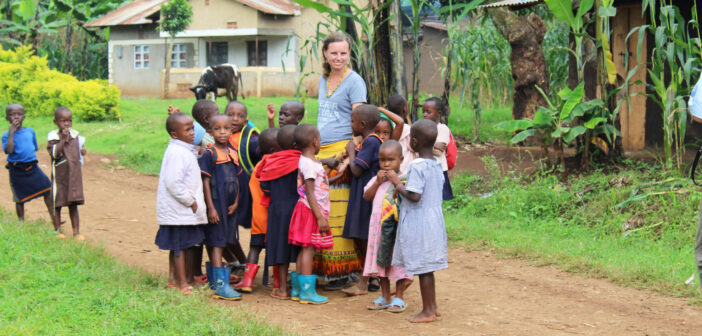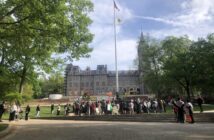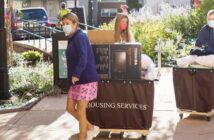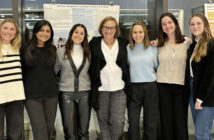Kelly Austin has had 34 consecutive first days of school.
A tenured professor of sociology and recently the new associate dean of undergraduate programs, Austin doesn’t seem to know when to take a break.
She has never walked away from academia, coming to Lehigh as a professor directly after earning her graduate and doctoral degrees from North Carolina State University.
“I’ve literally always had a first day of school,” Austin said. “I’ve never taken a gap year any time. That’s how much I love learning and love school.”
Austin said she always knew she would end up in academia and applied to work at Lehigh because of its size and quality of students whom she would soon begin influencing and inspiring.
Although Austin just received her doctorate in 2012, she has already been promoted to the rank of full professor and held a number of leadership roles at Lehigh. She accredits her accomplishments to her work with undergraduate students, her hefty research portfolio, and her study abroad program in Uganda.”
Austin being academically gifted, said she struggled with knowing what to study when she started her bachelor’s degree at Oregon State University, ultimately graduating in 2006.
It was the relationships she cultivated with her advisers that guided her to study sociology. This experience taught her about the importance of undergraduate advising, which she makes a big part of her position as the dean of undergraduate programs now at Lehigh.
In her position, a very public-facing role, Austin said she wears multiple hats. Unlike the other positions she’s held, she doesn’t get breaks over the summers, as she is busy onboarding prospective students.
“I was drawn to this position because I love working with undergraduates,” Austin said. “I love helping students who maybe even struggle with some of the similar things that I (did), like, ‘I have no idea what I want to study.’”
Austin saw the value and importance that advising and interdisciplinary curricula played in her undergraduate career and has made it a point to form personal relationships with her advisees, like Ghay Soe, ‘26.
Austin served as Soe’s first-year adviser, and he said she helped him navigate much of his first year. He said meeting Austin was a “blessing” because it was Austin who encouraged him to join the Iacocca Institute and travel to Uganda.
“Every step of the way, she just helped me through it all,” Soe said. “The best part is the guidance that she provided for me…She played a big role in the majority of the opportunities that I get here at Lehigh.”
Austin said she enjoys guiding students through their goals in undergraduate studies because their foundation is vital to the rest of their academic careers.
Her advising commitments and her study abroad experience in Bududa, Uganda, have been a large part of her professional and personal life and the start of countless published research papers that are grounded in her fieldwork.
Austin’s robust research portfolio contains studies on the connections between climate change, HIV, Malaria and deforestation, and these are all further proven in her fieldwork in Uganda, where she traveled for the first time in the summer of 2013.
Austin and her husband, Mark Noble, another professor of sociology, traveled to Bududa, which is one of the poorest districts in Uganda. After the first trip, the couple brought students along with them again as soon as spring break in 2014.
“I just knew it would be something that would change the lives of students and really open up their eyes,” Austin said.
As an experienced researcher, Austin understands the importance of fieldwork in research and the ability to connect objective mechanisms to personal explanations.
She purposefully designed the trip to have each student tailor their day-to-day activities within the community as they focus on their interests and skills to grow their resume. Students on the trip get involved with programs like volunteering in school classrooms, helping in school offices and advising sports programs and clinics.
Experiencing the village’s vibrant community and studying topics on the ground is what Austin said is valuable for students to see and understand for their own studies and personal lives. Austin said she thinks the trip’s success comes from how community-oriented it is, and that students live together in a challenging environment, learning how to endure and thrive in demanding situations.
“There’s no other Lehigh trip quite like this,” Austin said. “I think students realize through putting themselves in that situation how much they’re really capable of, and so they come back with confidence you wouldn’t have gotten if you would have pursued a more traditional or domestic summer internship.”
Austin said her many trips to Uganda have fundamentally changed her as a person. This trip has brought her down to earth and more of an empathetic person and educator, she said.
When Anna Sullivan, ‘26, first found out about the program in Noble’s sociology class, she was immediately interested and reached out to Austin for more information.
Austin ended up meeting individually with Sullivan for over an hour to tell her about the program.
Sullivan said she knew the experience would be a good fit and appreciated how she could tailor her daily itinerary. Sullivan gravitated toward conducting “youth assessments” on the children in the village about their educational and personal experiences.
“(Austin) planned it so that it was educational but also really emotionally meaningful for each student and that everybody felt their journey on the trip was valuable,” Sullivan said.
After her eight weeks in Uganda, Sullivan said she learned to slow down and deepen her connections with people, which Austin also makes a point to emphasize in building the cohort’s community.
Austin said her trip will always serve as a way to grow personal relationships with her students and foster community among the students and people of Bududa because they spend uninterrupted time mentoring and guiding one another.
Although Austin is not teaching this semester, she said she keeps her relationships with her community strong through advising and overseeing the Uganda program.
“I’m able to keep a beat on the pulse of what’s going on and what the main challenges are with students,” Austin said. “And I think that helps inform how I spend my time or what initiatives I try to work on.”






Comment policy
Comments posted to The Brown and White website are reviewed by a moderator before being approved. Incendiary speech or harassing language, including comments targeted at individuals, may be deemed unacceptable and not published. Spam and other soliciting will also be declined.
The Brown and White also reserves the right to not publish entirely anonymous comments.
1 Comment
I’m a prospective student of the class of ’28, and after attending the in-person information session for CAS, I was moved by Dr. Austin and specifically this experience. Maybe one day I’ll attend!